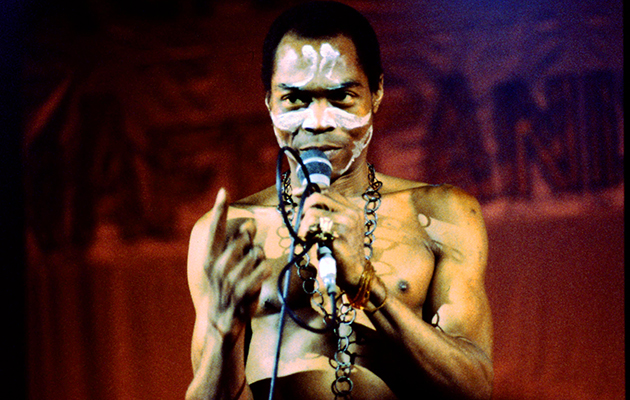Originally published in Uncut's April 2013 issue If there is such a thing as a good time and place to be buried alive, a freezing January night in North London isn’t it. Yet here we were, a crowd of maybe 150 of us huddled outside The Town & Country Club in early 1984 as a half-naked man in a...
The role of unruly populist rebel was an unlikely destiny for Fela. His father was an Anglican pastor and headmaster, his mother a nationalist aristocrat and campaigner for women’s rights. Fela Ransome-Kuti was meant to be a doctor, like his two brothers, and in 1958, aged 19, he was sent to study in England. Instead, Fela enrolled in the Trinity College Of Music, where he learned keyboards, trumpet and classical music – he later cited Handel as his favourite musician.
Fela’s life in early 1960s London was far from his riotous, libertarian existence a decade later. He married Remi Taylor in 1960 and had three children, Yeni, Femi and Sola. Along with other expats, he played jazz and highlife around the capital’s R’n’B clubs, where he befriended future collaborator Ginger Baker. “Fela used to come down to the all-nighters in The Flamingo,” remembers Baker today. “He was playing trumpet. That’s when we got to know him. He was crazy! But a very likeable fella. He was a very good friend of mine.”
In 1963, Fela returned home to a job at Nigeria’s national radio station, NBC, that soon fizzled out. Fela was more interested in his band, Koola Lobitos, for whom he had recruited a phenomenal young drummer, Tony Allen. “Fela wasn’t really the bandleader,” says Baker. “I mean, it was his band, but the actual bandleader was Tony Allen, who used to tune everybody up and organise everything.”
The band’s success was limited – increasingly, West Africa was under the spell of Latin and soul, especially James Brown. In 1969, he accepted an invitation to tour America with Koola Lobitos. In Los Angeles, Fela met Black Power activist Sandra Smith (later Sandra Izsadore), who “gave me the education I wanted,” Fela said later. “She was the one who opened my eyes… She talked to me about politics, history… I heard things I’d never heard before about Africa.”
Inspired by Malcolm X, Eldridge Cleaver and the “black and proud” mood of soul music, Fela perceived the process of neo-colonial control that held sway back home. “Being African didn’t mean anything to me until later in my life,” he said in the mid-1980s. “We weren’t even allowed to speak our own languages in school. They called it ‘vernacular’, as if only English was the real tongue.”
Fela also discovered the psychedelic soul of Sly, Hendrix and The Temptations. He had started calling his music Afrobeat back in 1967, but now it had evolved into a radical fusion of Ghanaian highlife, Nigerian juju and pared-down American funk, all streamed through Fela’s increasingly pan-African perspective.
Returning to Lagos, Fela opened a club, The Afro-Spot, in the suburb of Yaba, and renamed his band Nigeria 70, then Africa 70. In 1970, James Brown played Lagos’ Onikan Stadium. Fela attended the show, only to find Brown’s band checking him out later at The Afro-Spot.
“They had a James Brown rhythm section, plus eight percussionists, doing the African rhythm thing,” recalled Brown’s musical director Dave Matthews. “You couldn’t sit down, it was so infectious. It was an amazing experience.”
Today, Tony Allen remembers Brown’s “musicians came to our club to see us every night after their show. People like Bootsy were writing down my patterns. I didn’t mind, it was flattering. But the truth is that James Brown’s band learnt more from African musicians than African musicians learnt from them.”



